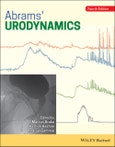A complete guide to urodynamic investigation in modern health care
Urodynamic testing is an ever-advancing field with applications in the management of patients from across a wide range of clinical areas. Bringing together fundamental principles and cutting-edge innovations, Abrams’ Urodynamics has been designed as an all-in-one guide to Functional Urology and Urogynecology, offering direct, up-to-date instruction on how to best perform and understand urodynamic tests within the overall treatment pathway. Its chapters cover everything from everyday basic practice to advanced complex cases, and are enhanced with more than 450 helpful illustrations. Including numerous revisions and new features, this fourth edition of the book boasts:- Coverage of all investigative approaches, including uroflowmetry, cystometry, video-urodynamics, and non-invasive techniques- Details on the successful running of a urodynamic unit, with information on organizational issues, equipment set-up, and common problems and pitfalls- Sections addressing children, women, men, the elderly, and neuropaths- Extensive description of International Continence Society (ICS) Standards throughout- Appendices that include ICS Standards and Fundamentals documents, ICIQ modules, and Patient Information Leaflets
With its wealth of clinical tips, illustrations, new innovations, and hands-on advice, Abrams’ Urodynamics is essential reading for all those wishing to better integrate urodynamic testing into their daily practice.
Table of Contents
Abbreviations ix
Contributors xi
Preface xv
First Foreword xvii
Second Foreword xix
Part I Basic Principles 1
1. Basic Urodynamics and Fundamental Issues 3
Marcus Drake, Andrew Gammie, Laura Thomas, Arturo García-Mora, and Hashim Hashim
2. Applied Anatomy and Physiology 24
Chendrimada Madhu and Marcus Drake
3. The Physics of Urodynamic Measurements 45
Andrew Gammie
Part II Functional Urology 53
4. Patient Assessment 55
Musaab Yassin, Alan Uren, and Nikki Cotterill
5. Treatments for Lower Urinary Tract Dysfunction 73
Sharon Yeo and Hashim Hashim
Part III Urodynamic Techniques 93
6. Uroflowmetry 95
Amit Mevcha and Richard Napier-Hemy
7. Cystometry and Pressure-Flow Studies 109
Marcus Drake, Rachel Tindle, and Su-Min Lee
8. Video Urodynamics 158
Marcus Drake, Michelle Ong, Devang Desai, Michel Wyndaele, Mark Woodward, and Hashim Hashim
9. Ambulatory Urodynamics 193
Julie Ellis-Jones and Wendy Bevan
10. Studies Assessing Urethral Pressures 199
Dharmesh Kapoor and Marcus Drake
11. Non-invasive Urodynamics 217
Alison Bray, Christopher Blake, and Christopher Harding
Part IV Urodynamics in Clinical Practice 227
12. Urodynamics in Children 229
Jonathan S. Ellison, Guy Nicholls, and Mark Woodward
13. Urodynamics in Women 242
Wael Agur, Ruben Trochez, Antonin Prouza, George Kasyan, and Abdelmageed Abdelrahman
14. Urodynamics in Men 273
Arturo García-Mora, Connie Chew, and Marcus Drake
15. Structural Changes of the Bladder Outlet 301
Michelle Ong, Marcus Drake, and Devang Desai
16. Neurological Disease and LUTS 313
Marcus Drake, Jeremy Nettleton, and Mohammed Belal
17. Urodynamics in Older People 360
Su-Min Lee and Emily Henderson
Part V Running a Urodynamics Unit 369
18. Troubleshooting During Urodynamics 371
Laura Thomas, Rachel Tindle, and Andrew Gammie
19. Artefacts in Urodynamics 383
Andrew Gammie
20. Anorectal Physiology 394
Laura Thomas and Kathryn McCarthy
21. Organisation of the Urodynamic Unit 406
Laura Thomas, Alexandra Bacon, Joanne Sheen, and Andrew Gammie
22. Equipment 412
Andrew Gammie
23. Working with Limited Resources 415
Andrew Gammie, Laura Thomas, Marcus Drake, and Eskinder Solomon
24. Research Evidence on the Clinical Role of Urodynamics 420
Andrew Gammie, Marcus Drake, and Hashim Hashim
Appendices
Key Patient Assessment Tools from the International Consultation on Incontinence Questionnaires (ICIQ) 423
ICIQ-FLUTS 423
ICIQ-MLUTS 427
ICIQ-BD 432
Fundamentals Documents from the International Continence Society 434
N&U 2018 Volume 37 Supplement 6 434
Editorial Comment 439
A Commentary on Expectations of Healthcare Professionals When Applying the International Continence Society Standards to Basic Assessment of Lower Urinary Tract Function 440
Fundamentals of Terminology in Lower Urinary Tract Function 446
Basic Concepts in Nocturia, Based on International Continence Society Standards in Nocturnal Lower Urinary Tract Function 453
Neurological Lower Urinary Tract Dysfunction Essential Terminology 458
The Fundamentals of Chronic Pelvic Pain Assessment, Based on International Continence Society Recommendations 465
How to Use the Pelvic Organ Prolapse Quantification (POP-Q) system? 472
The Fundamentals of Uroflowmetry Practice, Based on International Continence Society Good Urodynamic Practices Recommendations 477
Fundamentals of Urodynamic Practice, Based on International Continence Society Good Urodynamic Practices Recommendations 483
Basics of Videourodynamics for Adult Patients With Lower Urinary Tract Dysfunction 494
Why ICS Standardization of Lower Urinary Tract Symptoms Matters 500
Critical Steps in Developing Professional Standards for the International Continence Society 502
Patient Information Leaflets from the Bristol Urological Institute 508
Free Flow Rate Testing 508
Urodynamics 515
Practice, Standards, and Equipment Recommendations 530
International Consultation on Incontinence 2016; Executive Summary: Urodynamic Testing 531
United Kingdom Continence Society: Minimum Standards for Urodynamic Studies, 2018 539
UK Centre for Evidence-Based Purchasing; Buyers’ Guide Urodynamics Systems 571
International Continence Society Good Urodynamic Practices and Terms 2016: Urodynamics, uroflowmertry, cystometry, and pressure-flow study 578
Good Urodynamic Practices Documents from the International Continence Society 595
Good Urodynamic Practices: Uroflowmetry, Filling Cystometry, and Pressure-Flow Studies 596
Index 610








